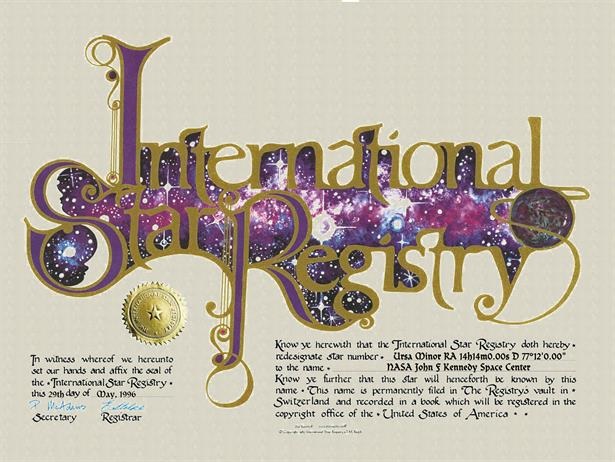John F. Kennedy's Star will Always Shine
Modified: July 1, 2023 Author: International Star Registry

John Fitzgerald Kennedy, commonly known as JFK or Jack, was an American politician and the 35th President of the United States, serving from 1961 until his tragic assassination in 1963. Born on May 29, 1917, into the prestigious Kennedy family in Brookline, Massachusetts, JFK’s early life was marked by privilege and a commitment to public service. After graduating from Harvard University in 1940, Kennedy joined the U.S. Naval Reserve the following year. During World War II, he showed immense courage and leadership as the commander of PT boats in the Pacific theater. The story of his survival following the sinking of PT-109 and his efforts to rescue his fellow sailors made him a war hero and earned him the Navy and Marine Corps Medal, albeit with significant injuries. Following his military service, Kennedy briefly pursued a career in journalism before venturing into politics. He represented a working-class district in Boston in the U.S. House of Representatives from 1947 to 1953 and was later elected to the U.S. Senate, serving as the junior senator for Massachusetts from 1953 to 1960. During his time in the Senate, Kennedy authored the Pulitzer Prize-winning book, “Profiles in Courage,” showcasing his dedication to the principles of courage and integrity in public service.
The pinnacle of Kennedy’s political career was his successful campaign in the 1960 presidential election. His youthful charisma, sharp wit, and strong performance in the first televised presidential debates in American history helped him narrowly defeat his Republican opponent, Richard Nixon. Kennedy’s presidency coincided with the height of the Cold War, and he faced numerous challenges in international relations. Focused on containing the spread of communism, he increased the number of American military advisers in South Vietnam and launched the Strategic Hamlet Program. In 1961, he authorized the Bay of Pigs Invasion, a failed attempt to overthrow the Cuban government led by Fidel Castro. Later, he also approved Operation Mongoose, aimed at removing communists from power in Cuba. His administration’s efforts to counter communist influence culminated in the Cuban Missile Crisis of 1962, a tense standoff between the United States and the Soviet Union over the deployment of nuclear missiles in Cuba. Despite the potential for global conflict, Kennedy’s diplomacy and resolve helped avert disaster, leading to the signing of the first nuclear weapons treaty in October 1963.
In addition to his foreign policy accomplishments, Kennedy left a profound impact on domestic affairs. He established the Peace Corps, a volunteer program that sent young Americans to developing countries to provide humanitarian assistance and foster cross-cultural understanding. Kennedy also promoted the Alliance for Progress, a program aimed at improving economic and social conditions in Latin American countries. Moreover, he continued to support the Apollo program initiated by his predecessor, which aimed to land a man on the Moon before the end of the decade.
Tragically, on November 22, 1963, President Kennedy’s life was cut short by an assassin’s bullet while he was traveling in a motorcade in Dallas. His untimely death shocked the nation and the world, and Vice President Lyndon B. Johnson assumed the presidency in the aftermath. Despite his short time in office, John F. Kennedy’s legacy endures. He is remembered as a visionary leader, a champion of civil rights, and an advocate for global peace. His ideas and policies, such as the Civil Rights Act of 1964 and the Alliance for Progress, continue to shape the nation’s progress and prosperity.
Beyond his remarkable contributions to politics and diplomacy, Kennedy’s influence extends to the realm of astronomy and astrology. In 1996, someone paid tribute to his enduring memory by naming a star after him through International Star Registry. This star, recorded as “NASA John F. Kennedy Space Center,” can be found in the Ursa Minor constellation, precisely located at RA 14h 14m 0.00s and D 77° 12′ 0.00″. Ursa Minor, also known as the Little Dipper, is a well-known constellation in the northern hemisphere. In both astronomy and astrology, stars have captivated human imagination for millennia, symbolizing guidance, aspiration, and eternal light. International Star Registry provides individuals with a unique opportunity to name a star after their loved ones or beloved figures like John F. Kennedy. It offers “buy a star” packages that allow individuals to record a star name, creating a lasting and celestial tribute to someone special.
In conclusion, John F. Kennedy’s life and accomplishments continue to inspire generations. His commitment to public service, diplomacy, and the pursuit of peace serves as a timeless example of leadership. International Star Registry provides a distinctive and memorable way to honor loved ones, celebrate special occasions, and cherish the memory of influential figures like JFK. Naming a star through International Star Registry is a unique and thoughtful gift for birthdays, weddings, and memorials, symbolizing an everlasting connection to the stars above.
References:
FAQ
Q. Where is the star named for the John F Kennedy Space Center?
A. This star is in the constellation Ursa Minor, also known as the little dipper or little bear.
Q. Where is the star name recorded?
A. This star is printed on page 360 the book Your Place in the Cosmos, Volume 4. This permanent catalog of named stars was published and copyrighted in 1996.
Q. What kind of Star Certificate do US Presidents Receive?
A. When you buy a star package to name a star, you will receive the same International Star Registry Certificate International Star Registry has issued since 1979. The star you name is just as special.
